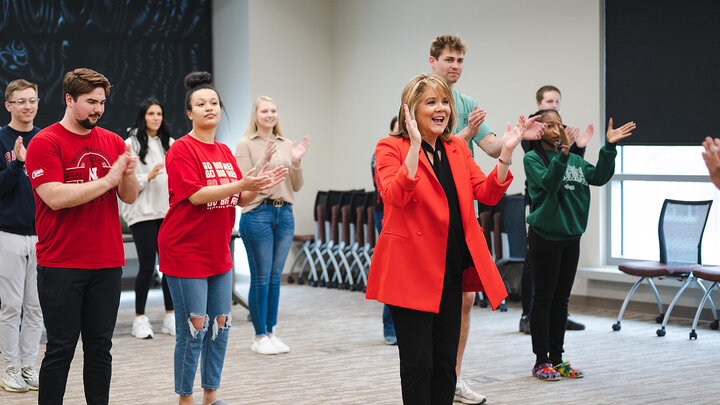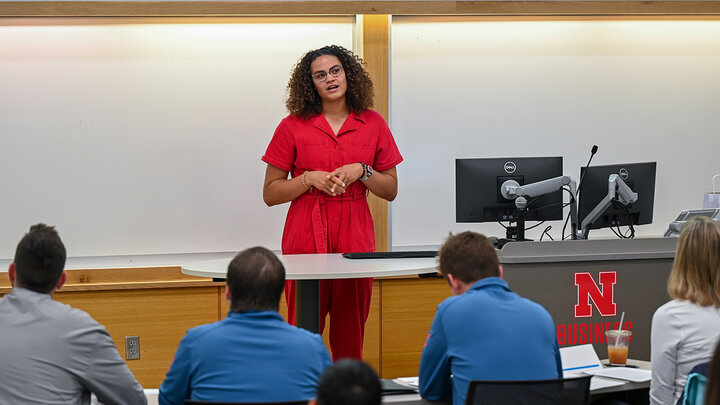The University of Nebraska–Lincoln College of Business will launch an innovative new undergraduate core curriculum in the fall of 2025, empowering business majors to lead the future of business through hands-on learning, corporate engagement and peer-to-peer mentorship.
“Anchored by transformative first-year courses and a culminating capstone experience, the new curriculum includes 23 courses aimed at preparing students to become data-driven decision-makers, effective communicators, purposeful strategists and empowered professionals,” said Kathy Farrell, James Jr. and Susan Stuart Endowed Dean and professor of finance. “These attributes describe the impactful and collaborative business leaders Nebraska creates.”
The holistic overhaul of the core curriculum stemmed from input from industry leaders and alumni who serve on the college's 17 advisory boards. A committee of faculty from each of the college's six academic departments, student services staff and college administrators spent two years researching and refining the new curriculum, which was approved in November.
First-Year Experience: Peer Mentorship and Real-World Engagement
Starting in the fall, all first-year business students will begin with three foundational courses: Introduction to Business (MNGT 101), Investing in Strengths (BSAD 111), and Career Development & Planning (BSAD 222).
“The Nebraska Business core curriculum immerses students in business education from day one. From exploring how the different disciplines intersect within a business to discovering personal strengths so they can refine and expand their career goals, our students build a strong foundation during their first-year experience,” said Laurie Miller, associate dean of undergraduate programs and curriculum and associate professor of practice in economics, who led the curriculum committee.
In Introduction to Business, the first-year students engage with every discipline in the college while supported by upperclass students who serve as peer coaches.
“This hands-on, team-based approach helps students build confidence as they learn to navigate the complexities of business using real-world situations. Students gain essential critical-thinking skills that will benefit them in their other courses and beyond,” said Kasey Linde, director of teaching, learning and accreditation, and a member of the core curriculum committee.
Students also receive guidance and mentorship from volunteer "business coaches" from the industry while preparing for their first college team-based competition that challenges them to solve real-world business problems. Alumni and professionals can express interest in serving as a business coach in the fall 2025 semester at https://business.unl.edu/businesscoach.
Students receive one-on-one coaching sessions from a trained student strengths coach in the Investing in Strengths (BSAD 111) class.
In the first eight weeks of the spring semester, first-year students continue with the same classmates in Investing in Strengths where they identify their top talents through the CliftonStrengths® assessment and learn how to leverage them for academic, professional and personal success. Guided by trained student strengths coaches, first-year students engage in one-on-one coaching to deepen self-awareness and discover how to use their unique abilities for success.
“We focus on helping students reach their full potential. The most impactful development often happens when they meet one-on-one with our amazing student coaches,” said Timothy Hodges, Joan Heiser Endowed Presidential Chair, executive director of the Clifton Strengths Institute and assistant professor of practice in management.
During the second eight weeks of the spring semester, students apply what they've learned about business and themselves in Career Development & Planning (BSAD 222). They continue to explore careers and participate in practice networking events.
“Our goal is to align students' interests, skills and values with career paths. They also work with peer coaches in individualized sessions to refine their resumes,” said Chris Timm, director of the Business Career Center.
New Courses: Business, Improv and Technology
After their first semester, students advance into business courses in accounting, business law, economics, finance, management, marketing and supply chain management.
The core curriculum also includes two new courses to help students gain an edge in the job market — Applied Improv for Successful Business Leaders (BSAD 261) and Navigating Emerging Technologies in Business (BSAD 340).
“Our industry partners shared that they are looking to hire employees with advanced communication and critical thinking skills who can adapt to new technologies. We're excited to extend our award-winning applied improv training to the entire college so students can elevate their verbal communication, adaptability and teamwork skills in an innovative, transformative way,” said Amanda Gonzales, associate professor of practice in accountancy and a member of the core curriculum committee. “The Navigating Emerging Technologies course will prepare students to be lifelong learners who can leverage new technology throughout their careers. These courses will set our students apart when they go to find internships and advance in their jobs.”
Capstone Experience: Showcasing Career Readiness With Corporate Partner
In Business Strategies (MNGT 475), the final course in the new core curriculum, students get to showcase their skills and gain impactful insight by working with corporate partners to find solutions for a multidisciplinary problem.
“This culminating capstone experience provides students with the opportunity to showcase what they have learned throughout their time at the College of Business. They gain impactful insight while working with the corporate partners to find solutions for a multidisciplinary problem,” said Miller.
The corporate partner also gets to connect with Nebraska Business students who will soon be in the job market.
“The new Nebraska Business core curriculum is a game changer for our students. They get to collaborate on real-world projects while developing their business, communication and leadership skills in a supportive environment with peer coaches and business mentors. They are encouraged to ‘fail forward’ as they learn and grow. By the time they reach the capstone course, students will have the confidence and competence to excel on a corporate project, showcase their career readiness and demonstrate their ability to lead the future of business,” Miller said.




